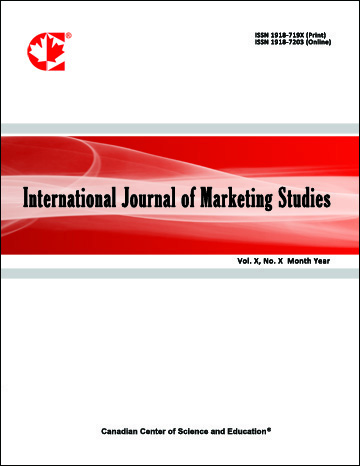Trade Sales Promotion Strategies and Marketing Performance in the Soft Drink Industries in Nigeria
- B. Nwielaghi Michael
- E. Ogwo
Abstract
Rapid changes in technology, over production, shortened product life cycles, increased competition owing toreduced barriers to domestic and international trade, mass communication and globalization have all contributed
to the need for a firm to have distinctive capabilities; which create a competitive advantage over others. We are
inclined to believe that fully utilized, competent and well-articulated trade sales promotion strategies constitute a
competitive advantage. With the notion that trade sales promotion strategies positively correlates with marketing
performance, firms view trade sales promotion strategy incompetence with grave concern. The effect of poor
trade promotion strategy performance is not limited to firms alone since organizations can and do experience
sub-optimal or out-right poor performance; but also to the economy as a whole. The aggregate business
performance of a country’s economic unit shapes its economy, since a nation’s wealth is measured mostly in
terms of its GDP. Among the factors critical to business profitability; fresh concerns about the efficacy of trade
promotion strategies is sparsely researched. This informs the research interest in this regard, recognizing the
unique role of trade sales promotion strategies that distinguishes it from other marketing communication
methods, and its critical roles in pushing and creating traffic for the manufacturer’s product. With a survey
research design, a regression model was formulated to incorporate eleven hypotheses of interests. Quantitative
data were collected through a 5-point Likert-type scale questionnaire. A total of 234 copies of questionnaire were
completed by senior promotion and sales executives of two major soft drink manufacturing firms and their
accredited distributors in Nigeria. We adopted Pearson’s ‘r’ and stepwise regression with its
constituents-ANOVA and T-test to determine the trade sales promotion activities that actually influence
marketing performance activities in these firms. Two of the hypothesized trade sales promotion strategies were
retained and adjudged relevant in determining marketing performance levels. Our findings reveal that Trade
promotion strategies affect marketing performance through the use of trade allowances and trade contests.
Notwithstanding this fact, the study notes that the firms are not at their optimal levels in both their trade
promotion strategies and marketing performance. We therefore recommend that for optimal levels to be achieved,
they should adopt trade promotion strategies that emphasize trade allowances and trade contests.
- Full Text:
 PDF
PDF
- DOI:10.5539/ijms.v5n4p96
Journal Metrics
Google-based Impact Factor (2021): 1.34
h-index (July 2022): 70
i10-index (July 2022): 373
Index
- Academic Journals Database
- CNKI Scholar
- EconBiz
- Electronic Journals Library
- Excellence in Research for Australia (ERA)
- GETIT@YALE (Yale University Library)
- Harvard Library
- IBZ Online
- Infotrieve
- JournalTOCs
- LOCKSS
- MIAR
- PKP Open Archives Harvester
- RePEc
- ResearchGate
- ROAD
- Scilit
- SHERPA/RoMEO
- Stanford Libraries
- UCR Library
Contact
- Alyssa SunEditorial Assistant
- ijms@ccsenet.org
